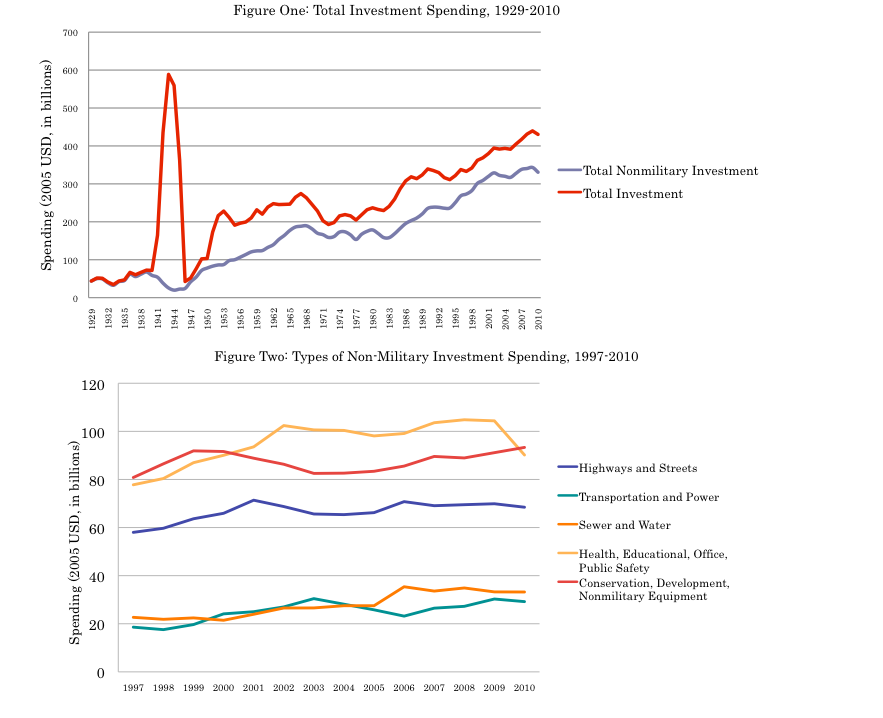ASSOCIATED EQUIPMENT DISTRIBUTORS
Executive Summary
The goal of this report is to understand the short- and long-term effects of public infrastructure spending on the U.S. economy, as well as to contribute new suggestions towards alternative financing of future road construction.
Estimated Short-Run Effects
In the short-run, a dollar spent on infrastructure construction produces roughly double the initial spending in ultimate economic output.
The biggest effects of infrastructure spending occur in the manufacturing and business services sectors.
In better economic times, spending on infrastructure construction generates a larger return. Yet even in a recession, the overall effects of initial spending still double output as they ripple through the economy.
Estimated Long-Run Effects
Over a twenty-year period, generalized ‘public investment’ generates an accumulated $3.21 of economic activity per $1.00 spent.
Over twenty years, investing $1.00 in highways and streets returns approximately $0.35 in tax revenue to federal and state/local governments, of which $0.23 specifically accrues at the federal level.
Over twenty years, investing $1.00 in sewer systems and water infrastructure returns a full $2.03 in tax revenue to federal and state/local governments, of which $1.35 specifically accrues at the federal level.
Spending on public infrastructure stimulates the U.S. economy in the short-run. Investing in infrastructure goes beyond mere improvements to the quality of roads, highways, sewers, and power plants. These investments also generate significant economic returns for other portions of the U.S. economy and substantially increase ultimate tax revenue for the government.
In order to adequately fund public infrastructure, the U.S. must seek innovative new funding mechanisms that do not burden rising deficits, and likely must stimulate the private sector. Programs like public-private partnerships, individual and corporate contributions to road financing and user fee lanes are potential mechanisms through which public spending on infrastructure can be supplemented beyond the gas tax.
THE ECONOMIC IMPACT AND FINANCING OF INFRASTRUCTURE SPENDING
Section 1.1. Introduction
Congress has not authorized new long-term spending on transportation infrastructure since the Safe, Accountable, Flexible, Efficient Transportation Equity Act: A Legacy for Users (SAFETEA-LU), which expired in 2009. Although there are currently several proposals for new financing, it remains unclear if these will become law, and what levels of spending Congress will likely appropriate. Other categories of infrastructure have also found their funding streams to be insufficient. The current debate in Congress and state capitals frames money spent on infrastructure as one-shot spending. However, money is not truly spent on infrastructure so much as invested in it, an investment that helps the economy to grow and directly returns tax revenue to the government. The aim of this research project is to understand these effects. Specifically, our goal is to determine the impact of infrastructure investment on economic activity, including the tax revenues generated by this investment, and to propose alternative funding ideas for highway investment.
Section 1.2. Transportation Infrastructure Spending Over Time
During the 20th century, spending on public infrastructure in the United States has consistently grown in magnitude. Over the last thirteen years, Congress has invested in infrastructure at rates higher than inflation. Figure One illustrates this trend. These numbers are measured in constant 2005 dollars, to control for inflation and to make comparisons from year to year more meaningful. The red line shows trends for all types of infrastructure spending, whereas the blue line excludes military spending. Both lines trend upward, but dipped briefly downwards after the start of the current recession in 2008.
Download the full report (PDF): The Economic Impact and Financing of Infrastructure Spending
Associated Equipment Distributors
www.aednet.org
“Associated Equipment Distributors (AED) is an international trade association representing companies involved in the distribution, rental and support of equipment used in construction, mining, forestry, power generation, agriculture and industrial applications.”
Tags: Associated Equipment Distributors, Infrastructure Funding







 RSS Feed
RSS Feed